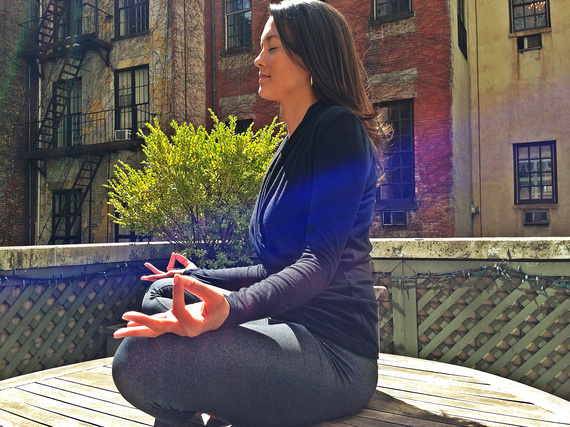
The chief financial officer of a multibillion-dollar company is listening to me kindly, at best. His face holds a polite smile, but his eyes are flat as if to reveal, "What you're saying sounds nice, but let's be realistic, it's not for me." I've gotten this look before, many times from many people.
This is the inevitable moment in conversation catch-ups with old business colleagues where I have a decision to make. Either I put myself out on a limb to further satisfy their question of, "But what can meditation really do for me at work?" Or, I just let it go and allow the conversation to drift to the safer topic of summer plans.
Today, I decide to go off-roading from the path of least resistance and explain myself further. This CFO and I worked together for years and he offered me guidance and perspective that can only come from someone who's been in the industry for over 25 years. Now it is my turn to explain an investment strategy to him: how meditation will have the biggest return for your time spent that day.
Meditation came on my radar years ago, because it is one of the cornerstones of the yoga practice. For me, it was surprising to learn the purpose of the physical practice of yoga (the asanas, or poses done on a mat) is to prepare the body and mind for meditation (dhyana) -- the mental practice of observing your thoughts in a calm and clear way so they eventually slow down and you feel a powerful stillness settle in. From the stillness of meditation arises the wisdom we all hold deep within ourselves of what's right and wrong for us in life.
Wow, sounds nice! But, if you've ever tried it, you'll know it's anything but easy. Early on, like the CFO with the glazed look in his eyes, I questioned if mediation was worth it. I was uncomfortable physically with cramped legs, and I was frustrated mentally with my uncontrollable, rapid-fire thoughts. Although it felt like "nothing was happening" each time in the beginning, I instinctually felt it was important to keep trying. If people ranging from Gandhi, Steve Jobs, Oprah, Rupert Murdoch and Russell Simons swore by it, there had to be something to it.
I now have a practice of 20 minutes daily, first thing in the morning, and it has changed my perspective on life. The following simple meditation analogies are the most valuable and motivating that I've heard.
Meditation Simplified 101:
1. "Meditation is the practice of watching your mind think," according to Sharon Gannon and David Life, co-authors and founders of Jivamukti Yoga. Your life is like a movie playing out on a big screen, with you as the star. When we step back and become a watcher of the movie, not just a participant in it, we can observe our habits, preferences and neuroses more clearly. Sharon and David continue to say, "We gain insight into the psyche as well as the subconscious mind."
2. Meditation unplugs us from the breakneck speed in which we live life, and it creates a shift in perspective. We begin to realize our thought patterns are often cyclical, hamster-wheel stories of drama and worry.
3. When we momentarily "let go" of these thought patterns in meditation (pause the movie reel), we create space -- a "gap" -- of quiet and peace in our mind. Our overworked brain gets time to rest; here we start to become more in tune with our own intuition and gut instincts.
4. From this gap, creativity unexpectedly sprouts. When you're not thinking about something is when the best ideas and answers come to you -- case in point: those brilliant ideas in the shower.
5. In our busy lives, big-picture perspective often gets buried, never reaching the surface. This perspective and important life insights are like seeds under the soil, desperate to sprout but trampled by the thousands of footsteps of our endless thoughts. Meditation pauses the footsteps and gives the seeds a chance to pop through the surface of the soil, from our subconscious to conscious.
6. The deep insight meditation provides allows us to better prioritize what's important to focus on now and what can wait. This insight cannot be achieved by working harder or longer; in fact, that clouds the mind. It can only come from looking inward through stillness.
The benefits of meditation are seen in my work life, every day. My attention is sharper. I listen more carefully to people and read situations more intuitively. I have heightened perspective during tough times; I can discern what's important and what's not with greater accuracy and speed.
I see a subtle shift in the CFO's face while listening to my explanation. His one eyebrow goes up slightly, and eventually, his head starts slowly nodding as he rubs his chin. I allow a potentially awkward silence to settle in and patiently wait for his response. It finally comes, the corners of his mouth pointing upwards. "OK, I get it," he says. "But how do you start meditating?"
Like riding a bike, you're not going to get it on the first go. You need training wheels and then someone holding the seat while you wobble down the street. My favorite tools follow -- they coached me early on in my practice and I hope they do the same for you:
- Deepak Chopra's 21 Day Meditation Challenges. Creating Abundance is particularly inspiring.
- Jack Kornfield's Meditation for Beginners. Comes with CD.
- Meditation for Dummies (Yes, that exists!)
A beginner's goal is to start with just five minutes a day, every day, for two weeks. Build up to 10, 15 then 20 minutes per day. The time spent meditating, getting in touch with your intuition, instinct and higher thinking, will be the best investment you can make in yourself.
OTHER BLOGS BY CHIYOKO: Can Yoga Help Save the Business World?
